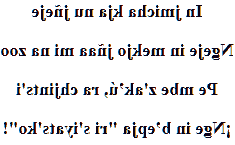Jñatrjo love poem
Nu Jñeje
In jmicha kja nu jñeje
Ngeje in mekjo jñaa mi na zoo
Pe mbe z'ak’ú, ra chjints'i
¡Nge in b’epja "ri s'iyats'ko"!
~Administrador & Editor de Mi Universo Mazahua~


→ French poem ←
Mazahua language
Love poem translated into central Mazahua language (Jñatrjo, Masawa, Atlacomulco-Temascalcingo, San Miguel Tenoxtitlán, Central Mazahua, Santa María Citendejé-Banos, Mazahua de oriente).
This tonal language of the otomangue otomi group, spoken by 80,000 Hñatho (the other name for the Mazahuas).
There are two main varieties of the Mazahua language, the second is Michoacán (Western Mazahua) which has three times fewer speakers.
If Jñatrjo is recognized in Mexico as an indigenous language, the number of people who speak it tends to decrease. We suppose the word mazahua has two origins, that of its first leader Mazatlí-Tecutli and the translation in Nahualt of "those who hunt the deer".
The Mazahuas
The Mazahuas (Hñatho, Tetjo ñaa jñatjo) are Native Americans who live in the southwest region of the state of Mexico state, in Mexico.
They still retain some of their traditions, whether cultural or sartorial (especially women's dresses), and their own governance system.
First hunters in a very wooded region, deforestation will have made them pass to agriculture (corn and agave), in the manufacture of textile handicrafts, then gradually to more industrial work, inherent in modern societies.
For 80 years it has been clear that they have dispersed within Mexico, towards Mexico City and even towards the United States.
As for the origin of their names, their origin is uncertain, for some they would descend from the Acolhuas and for others from a Chichimec group.
Mazatec - Amuzgo - Cuicatec - Zapotec - Tlapanec - Zenzontepec - Coicoyán Mixtec - Southern Puebla Mixtec